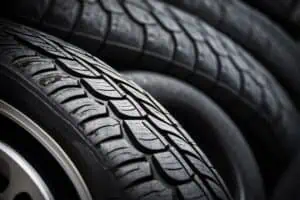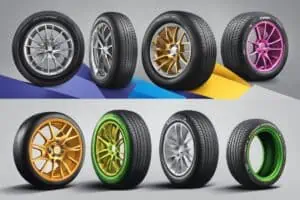Selecting the most reliable tire brands is integral for both safety and performance. Consumers and industry professionals alike consider longevity, grip, and overall quality when determining the most dependable tires on the market. With a multitude of brands vying for attention, recommendations are often based on rigorous research and consumer satisfaction to ensure drivers make informed decisions.

The tire industry undergoes constant evaluation from independent studies to consumer reports, assessing various brands on criteria such as durability, handling, and value for money. Reliable tire brands stand out by consistently securing high ratings across these categories. Quality tires are paramount to vehicular safety, making the choice of tire not just a matter of cost, but a crucial investment in a vehicle’s performance and its passengers’ well-being.
Through a combination of expert insights and feedback from consumers who put these tires to the test in real-world conditions, a picture of the industry’s most trusted brands emerges. Such aggregated results from surveys and studies provide a valuable guide for those seeking to purchase tires that offer peace of mind alongside superior road performance.
Skip ahead:
Assessing Tire Quality and Performance
When evaluating the most reliable tire brands, one should focus on specific criteria such as durability, traction, fuel efficiency, and wear. These factors contribute significantly to a tire’s performance and overall cost-effectiveness.
Durability and Tread Life
Tire durability is a critical assessment point, closely linked to tread life. Treadwear rating is a standardized measure that predicts the tire’s longevity based on controlled tests. Tires with a high treadwear rating tend to last longer, indicating sturdier construction and resilience to wear.
Traction and Handling
The ability of a tire to maintain traction is paramount, and this is tested through grip and braking evaluations. Superior traction is characterized by a tire’s grip on the road in various conditions, including wet and dry surfaces. Handling pertains to how well tires respond to steering, with performance in cornering being a key aspect of a tire’s handling capabilities.
Fuel Economy and Rolling Resistance
Fuel economy is significantly influenced by a tire’s rolling resistance, which measures how much energy is lost as the tire rolls. Lower rolling resistance indicates better fuel efficiency since less energy is wasted. Manufacturers often test tires to determine their impact on fuel consumption, looking for an optimal balance between low rolling resistance and high performance.
Top Tire Brands and Models
When considering tire purchases, consumers look to certain brands that have established a reputation for reliability, innovation, and value. This section will explore the leading manufacturers known for their top-tier tire models, highlight some innovative tire technologies they’ve brought forward, and reveal the budget-friendly picks that deliver performance without breaking the bank.
Leading Manufacturers
- Bridgestone: Known for models like the Potenza and Turanza, Bridgestone stands out for its high-performance tires which offer excellent grip and handling.
- Michelin: The manufacturer’s commitment to safety, longevity, and fuel efficiency is evident in acclaimed models like the Michelin Pilot and Premier series.
- Goodyear: With a vast array that includes the Assurance and Eagle lines, Goodyear continues to be a popular choice for a variety of driving conditions.
Innovative Tire Technologies
- Continental’s ContiSeal™ Technology: Aims to seal punctured tire tread up to 5 mm in diameter, exemplifying innovation in ensuring driving safety and convenience.
- Pirelli’s P Zero line: The choice for high-end performance vehicles, integrating advanced materials and tread design for superior sports performance.
Budget-Friendly Picks
- Cooper Tires: Offers the CS5 and Discoverer series, known for delivering reliable performance at a competitive price point.
- Kumho Tires: The Solus and Ecsta lines are praised for their solid performance and affordability, making them an excellent choice for cost-conscious buyers.
This curated list provides a snapshot of highly-regarded tire brands and models that cater to a spectrum of preferences and needs, reflecting the diversity and innovation within the tire manufacturing industry.
Tire Selection for Different Driving Conditions
Choosing the right tires greatly affects a vehicle’s performance and safety. Depending on the driving conditions one frequently encounters, whether general road use, diverse terrains, or specific weather conditions, selecting the proper tire type is critical.
All-Season Versus All-Terrain Tires
All-season tires are designed for a balance of capabilities. They provide adequate performance in a variety of conditions including wet and lightly snowy roads. These tires are a practical choice for everyday driving in most climates. On the other hand, all-terrain tires are tailored for drivers who venture off-road or onto less-developed paths while still requiring good on-road performance. Their aggressive tread patterns and durable construction are ideal for handling rough surfaces, but they may also produce more road noise and a slightly less comfortable ride on paved roads.
- All-Season Tires: Best for wet and dry pavement, light winter weather.
- All-Terrain Tires: Suited for off-road conditions, as well as pavement.
Specialty Tires for Winter
Winter tires, also known as snow tires, are specifically developed to perform in winter conditions such as ice, snow, and slush, along with colder temperatures. They are made from a softer rubber compound that remains flexible in cold weather, which improves winter traction. Their tread designs are also unique, often with deeper grooves and biting edges to grip onto snow and ice. For drivers facing severe winter weather, these tires are essential.
- Winter Tires: Necessary for harsh winter conditions and temperatures below 45°F.
Performance Tires for Sport Driving
Performance tires are built for enhanced handling, cornering, and higher speeds typically associated with sports cars. They feature a stickier tread compound for better road grip and a stiffer sidewall to improve response time and agility. While they offer superior handling in dry and wet conditions, they are not designed for winter weather and should be switched out for winter tires or all-season tires depending on the climate.
- Performance Tires: Ideal for dynamic driving in good weather conditions; not suitable for snow.





























